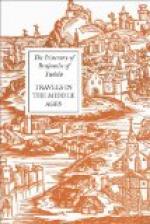From Marseilles one can take ship and in four days reach Genoa, which is also upon the sea. Here live two Jews, R. Samuel, son of Salim, and his brother, from the city of Ceuta, both of them good men. The city is surrounded by a wall, and the inhabitants are not governed by any king, but by judges whom they appoint at their pleasure. Each householder has a tower to his house, and at times of strife they fight from the tops of the towers with each other. They have command of the sea. They build ships which they call galleys, and make predatory attacks upon Edom and Ishmael[19] and the land of Greece as far as Sicily, and they bring back to Genoa spoils from all these places. They are constantly at war with the men of Pisa. Between them and the Pisans there is a distance of two days’ journey.
Pisa is a very great city, with about 10,000 turreted houses for battle at times of strife. All its inhabitants are mighty men. They possess neither king nor prince to govern them, but only the judges appointed by themselves. In this city are about twenty Jews, at their head being R. Moses, R. Chayim, and R. Joseph. The city is not surrounded by a wall. It is about six miles from the sea; the river which flows through the city provides it with ingress and egress for ships.
From Pisa it is four parasangs to the city of Lucca, which is the beginning of the frontier of Lombardy. In the city of Lucca are about forty Jews. It is a large place, and at the head of the Jews are R. David, R. Samuel, and R. Jacob.
[p.8]
Thence it is six days’ journey to the great city of Rome. Rome is the head of the kingdoms of Christendom, and contains about 200 Jews, who occupy an honourable position and pay no tribute, and amongst them are officials of the Pope Alexander, the spiritual head of all Christendom. Great scholars reside here, at the head of them being R. Daniel, the chief rabbi, and R. Jechiel, an official of the Pope[20]. He is a handsome young man of intelligence and wisdom, and he has the entry of the Pope’s palace; for he is the steward of his house and of all that he has. He is a grandson of R. Nathan, who composed the Aruch[21] and its commentaries. Other scholars are R. Joab, son of the chief rabbi R. Solomon, R. Menachem, head of the academy, R. Jechiel, who lives in Trastevere, and R. Benjamin, son of R. Shabbethai of blessed memory. Rome is divided into two parts by the River Tiber. In the one part is the great church which they call St. Peter’s of Rome. The great Palace of Julius Caesar was also in Rome[22].
[p.9]
There are many wonderful structures in the city, different from any others in the world. Including both its inhabited and ruined parts, Rome is about twenty-four miles in circumference. In the midst thereof[23] there are eighty palaces belonging to eighty kings who lived there, each called Imperator, commencing from King Tarquinius down to Nero and Tiberius, who lived at the time of Jesus the Nazarene, ending with Pepin, who freed the land of Sepharad from Islam, and was father of Charlemagne.




